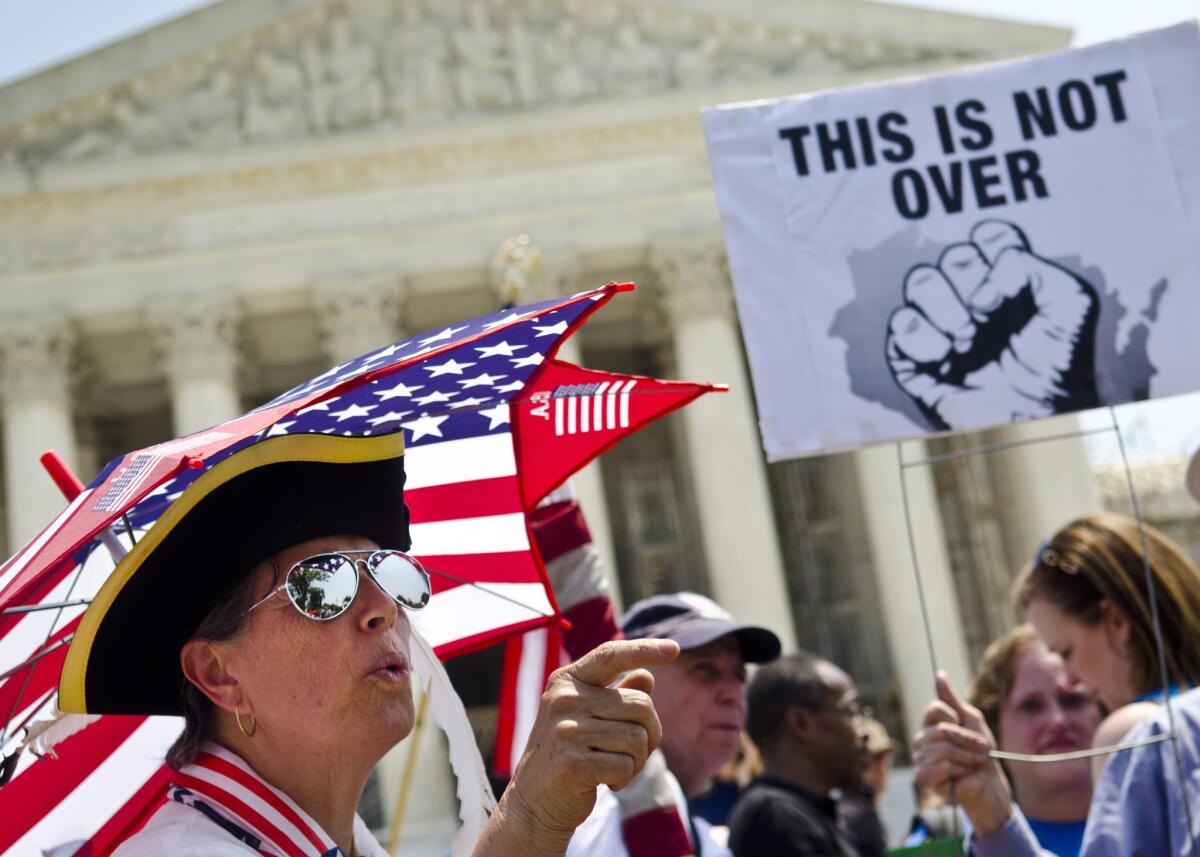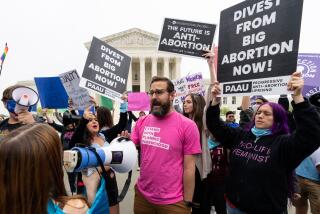Tax label is a small price to pay for survival of healthcare reform

WASHINGTON -- The Supreme Court upheld the heart of President Obama‘s healthcare law Thursday, ruling 5-4 in favor of the requirement that, starting in 2014, individuals either obtain healthcare coverage or pay a tax.
Chief Justice John G. Roberts Jr. sided with the court’s four Democratic appointees to uphold the Affordable Care Act, the centerpiece of Obama’s domestic legislative program.
“We do not consider whether the Act embodies sound policies. That judgment is entrusted to the Nation’s elected leaders,” Roberts wrote. “We ask only whether Congress has the power under the Constitution to enact the challenged provisions.”
Although he answered that question in the affirmative, Roberts agreed with the law’s conservative critics -- and the court’s four other conservatives -- who said Congress does not have the power to require people to buy a product such as health insurance.
But, he said, the law does not truly impose such a mandate on Americans. It simply requires those who do not have health insurance to pay a tax penalty. That tax requirement, he said, passes constitutional muster.
“The federal government does not have the power to order people to buy health insurance,” he wrote. “The federal government does have the power to impose a tax on those without health insurance.”
The justices also upheld a major expansion of the Medicaid program, which is one of the chief ways the law sought to expand coverage of the uninsured. But, they said, the federal government cannot force states to participate. Those states that do not want to expand Medicaid, even if the federal government pays for most of the expansion, will have to be given the right to opt out.
That part of the ruling could open the way for significant differences in healthcare coverage between liberal states, which already have said they welcome the additional federal money for expanded coverage, and conservative ones. Some Republican governors have indicated they want to reject the expanded coverage.
Justice Anthony M. Kennedy, the usual swing vote, joined the other conservative dissenters in a joint opinion arguing that the entire law should have been struck down.
Both the outcome and the lineup surprised many in Washington who had expected Kennedy to be the court’s swing vote and for Roberts to side with the court’s conservative bloc against the law.
During the court’s oral arguments this spring, Roberts had asked many sharply worded questions that expressed skepticism about whether a mandate to buy health insurance would be constitutional. But although the government in its legal briefs had argued that the taxation power created a basis for upholding the law, that point came up only rarely in the oral arguments.
The tax would start at $95 in 2015 and increase to $695 by 2017. Even at that rate, considerably less than the cost of insurance, it is expected to raise about $4 billion a year to help pay for healthcare coverage.
Democrats had gone to great lengths during the congressional debate over the healthcare law to argue that they were not passing a new tax. And Republicans immediately seized on the court’s language to tag Obama as a tax raiser.
But for the president and his aides, who had staked the success of Obama’s presidency on passage of the healthcare law, that tax label seemed a small price to pay.
Obama was quick to praise the court’s decision, going before television cameras at the White House about two hours after the decision to pronounce it “a victory for people all over this country whose lives will be more secure because of this law and the Supreme Court’s decision to uphold it.”
He listed many of the provisions of the law that have proved popular, including the requirement that insurance companies cover people who have preexisting health conditions, the expansion of prescription drug coverage for the elderly and the federal subsidies designed to help people buy insurance, starting in 2014.
“I know the debate over this law has been divisive. I respect the very real concerns that millions of Americans have shared,” Obama said.
“The highest court in the land has now spoken. We will continue to implement this law. And we’ll work together to improve on it where we can. But what we won’t do -- what the country can’t afford to do -- is re-fight the political battles of two years ago, or go back to the way things were.”
For a brief moment earlier in the morning, Obama thought he had lost the fight. Although the White House gets an early heads up on most major announcements in Washington, it gets no advance word on Supreme Court decisions. So as the decision hour of 10 a.m. EDT approached, Obama was standing outside the Oval Office, watching television on a four-way split screen showing several cable channels.
Initially, several stations got the court’s decision backward, leaving Obama thinking that the high court had struck down the law, according to a senior administration official who was present.
After a few moments, however, White House Counsel Kathryn Ruemmler walked in and gave Obama two thumbs-up, making the announcement that the law had been upheld. The president hugged the bearer of the good news and turned to walk into his office.
Republican candidate Mitt Romney, who also waited for the court’s decision in Washington, used the decision as a call to arms for Republicans.
“Our mission is clear. If we want to get rid of Obamacare, we are going to have to replace President Obama. My mission is to make sure we do exactly that,” he said, standing behind a lectern decorated with a sign that proclaimed “Repeal and Replace Obamacare.”
“Obamacare was bad policy yesterday, it’s bad policy today. Obamacare was bad law yesterday, it’s bad law today,” Romney said, adding that it “puts the federal government between you and your doctor.”
At the same time, however, Romney expressed support for several of the law’s goals. “We’ve got to make sure that those people who have preexisting conditions know that they will be able to be insured and that they will not lose insurance,” he said. “We also have to ensure that we do our very best to help each state in their effort to assure that every American has access to affordable healthcare.”
He did not say how he would achieve those goals. As governor of Massachusetts, Romney won passage of a state law that imposed a mandate for insurance coverage quite similar to the one in the federal law. He has since said he does not see the Massachusetts law as a model for the rest of the country.
Among the many political combatants cheering or jeering the court’s decision, few were as effusive as House Democratic Leader Nancy Pelosi (D-San Francisco), the former speaker whose party lost control of the chamber after she pushed the healthcare overhaul through Congress.
After leaving congratulatory phone messages for President Obama and Vice President Joe Biden, Pelosi reached Vicki Kennedy, whose late husband, Sen. Edward M. Kennedy (D-Mass.), had championed universal healthcare.
“Now, Teddy can rest,” Pelosi told her.
Shortly afterward, heading to a hastily called Democratic caucus meeting to discuss the decision, Pelosi ran into a longtime friend, Rep. George Miller (D-Martinez), and they hugged, according to an aide.
“What a great victory!” Pelosi said.
“You bet your ass,” Miller responded.
“I did,” she said, as they laughed.
More to Read
Get the L.A. Times Politics newsletter
Deeply reported insights into legislation, politics and policy from Sacramento, Washington and beyond. In your inbox three times per week.
You may occasionally receive promotional content from the Los Angeles Times.











